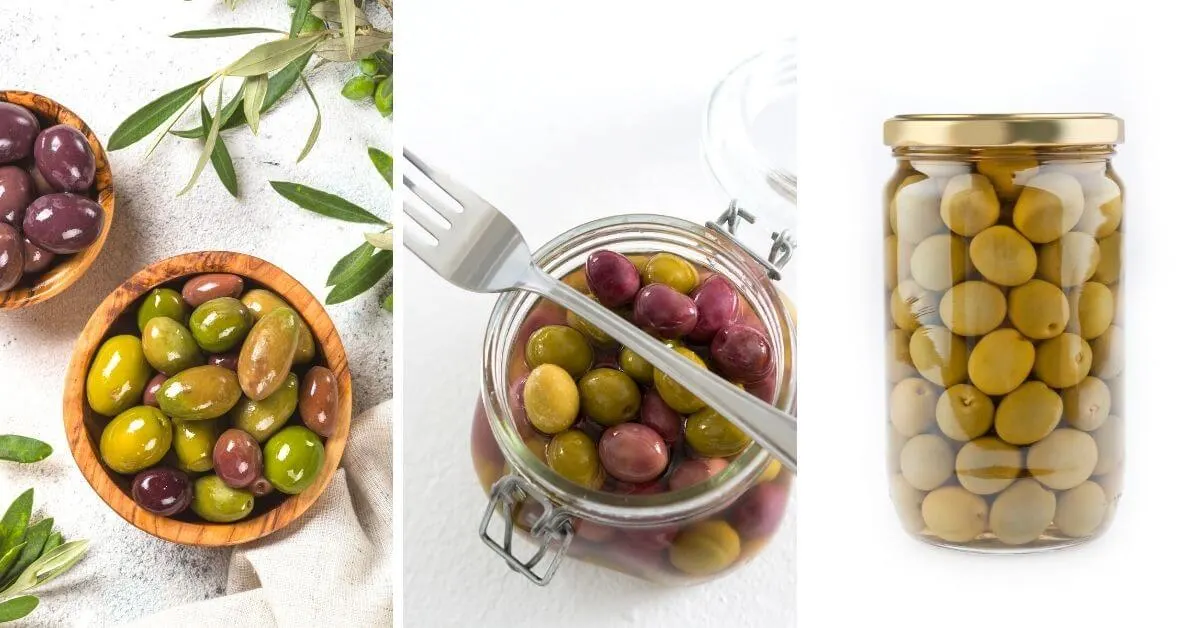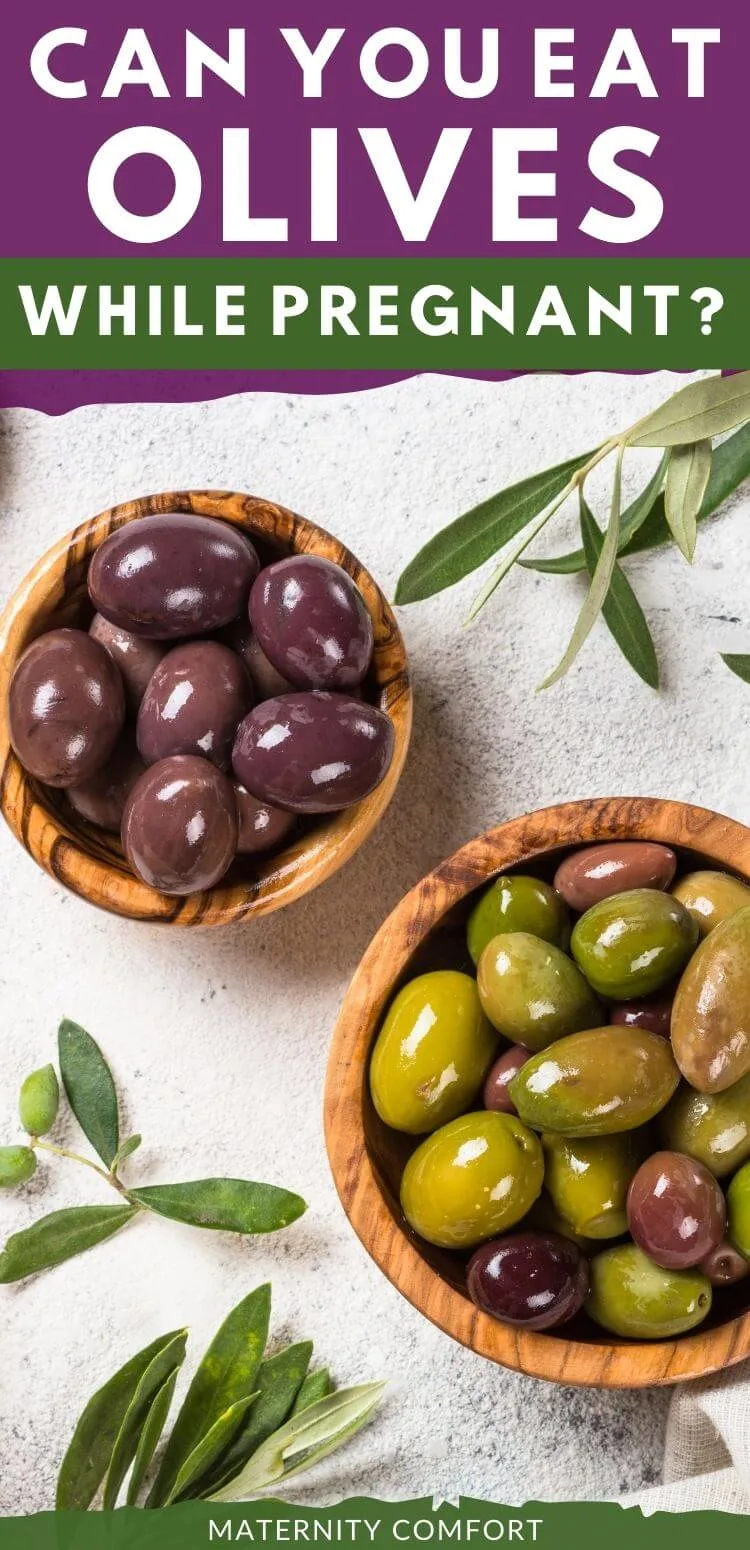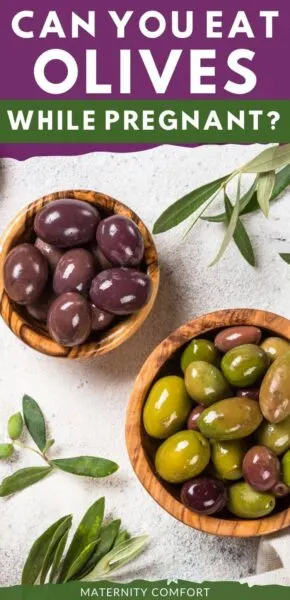Updated May 8, 2023
If you’re pregnant and love olives, you may be wondering if it’s safe to eat them during your pregnancy.
Can pregnant women eat olives?
You’ll be happy to know that, yes, pregnant women can eat olives.
However, there are a few things you need to keep in mind when preparing them.
In this blog post, we will discuss the health benefits of olives for pregnant women and give you some tips on how to safely prepare them during your pregnancy.

Can Pregnant Women Eat Olives?
We asked our OB/GYN Dr. Doug Penta, MD this question and Olives are a good source of healthy fats and antioxidants, both of which are important for pregnant women.
His only reservations are the same concerns that exist for other dairy products and foods susceptible to spoiling if not handled and stored properly.
Olives have healthy fats that are important for the development of the brain and nervous system in the unborn baby.
Antioxidants help protect the body against oxidative cell damage.
They also have a high content of vitamin E, which is important for the development of the immune system.

* When preparing olives during pregnancy, it’s important to avoid those that are unpasteurized or pickled in vinegar.
These types of olives can harbor bacteria that can be harmful to you and your baby.
Instead, always make sure to select olives that are pasteurized and packaged in water.
You should also make sure to wash them thoroughly before eating them.
If you’re looking for a healthy and delicious way to add olives to your diet during pregnancy, try them in salads, on pizzas, or in pasta dishes.
You can also stuff them with cheese or other fillings for a tasty snack.
Just remember to wash them thoroughly, store them properly (refrigeration), not eat unpasteurized olives, or olives pickled in vinegar.
With these tips in mind, you can enjoy olives safely during your pregnancy.
Can you eat Olives during pregnancy first trimester?
Yes, pregnant women can eat olives during the first trimester as long as the precautions listed above are followed. Good nutrition during the first trimester benefits healthy fetal development.
Olives are a good source of:
- Vitamin E
- Vitamin C
- Vitamin A
- Monounsaturated fats
- Omega-3 fatty acids
Can I eat stuffed olives while pregnant?
Yes, you can eat stuffed olives while pregnant as long as they are pasteurized.
It is best to eat stuffed olives that are jarred or canned to be sure they are safe.
You should also make sure to wash them thoroughly before eating them and be aware of what they are stuffed with.
If you have a question it is better to ask as additives might be off your list of safe foods.
Avoid eating stuffed olives from the deli counter to avoid cross-contamination with other unpasteurized dairy products that might be in the same dairy case.
Can you eat marinated olives when pregnant?
Yes, pregnant women can eat marinated olives.
However, there are a few things you need to keep in mind when preparing them.
Pregnant women must avoid olives that are unpasteurized or pickled in vinegar.
These types of olives can harbor bacteria that can be harmful to you and your baby.
Instead, select olives that are pasteurized or packaged in water.
You should also make sure to wash them thoroughly before eating them.
If you follow these tips, you can enjoy eating olives safely during your pregnancy.
What are the benefits of eating Olives during pregnancy?
Olives are a good source of healthy fats and antioxidants, both of which are important for pregnant women.
Healthy fats are important for the development of the brain and nervous system in the unborn baby.
Antioxidants help protect the body against cell damage.
They also have a high content of vitamin E, which is important for the development of the immune system.
Can you eat olives when pregnant second trimester?
Yes, pregnant women can eat olives during the second trimester.
However, there are a few things you need to keep in mind when preparing them.
Pregnant women should avoid olives that are unpasteurized or pickled in vinegar.
These types of olives can harbor bacteria that can be harmful to you and your baby.
Instead, select olives that are pasteurized or packaged in water.
Craving olives during pregnancy … boy or girl?
There is no scientific evidence to support the claim that craving olives during pregnancy indicate whether you are having a boy or girl.
However, some old wives’ tales say that if you are craving salty foods like olives, it means you are having a boy.
Again, there is no scientific evidence to support this claim.
If you are pregnant and crave olives, enjoy them safely in moderation and follow the tips we have provided in this blog post.
Can eating too many olives cause constipation during pregnancy?
Eating too many olives can cause constipation during pregnancy because they are high in fat and low in fiber.
To avoid this, make sure to eat olives in moderation and increase your intake of other high-fiber foods like fruits, vegetables, and whole grains.
If you find yourself constipated, drink plenty of fluids and try a natural laxative like prune juice.
Can Pregnant women eat canned olives?
Pregnant women can eat canned olives as long as they are properly cooked.
Canned olives may contain bacteria that can be harmful to you and your baby if they are not cooked properly.
During pregnancy, it is important not to eat raw or undercooked olives.
Make sure to cook them until they are hot all the way through.
This will kill any harmful bacteria that may be present.
Can Pregnant women eat black olives?
Pregnant women can eat black olives.
Black olives are a good source of healthy fats and antioxidants, both of which are important for pregnant women.
Healthy fats are important for the development of the brain and nervous system in the unborn baby. Antioxidants help protect the body against cell damage.
They also have a high content of vitamin E, which is important for the development of the immune system.
Just remember to wash them thoroughly and do not eat unpasteurized or olives pickled in vinegar.
With these tips in mind, you can enjoy black olives safely during your pregnancy.
What should Pregnant women do if they have an allergy to Olives?
If you are pregnant and have an allergy to olives, avoid them altogether.
If you accidentally eat them and have a reaction, seek medical attention immediately.
Symptoms of an allergic reaction can include difficulty breathing, swelling of the face, tongue, or throat, hives, or dizziness.
If you experience any of these symptoms after eating olives, call 911 or go to the nearest emergency room.
Can Pregnant women eat green olives?
Pregnant women can eat green olives as long as they are properly cooked.
Canned green olives may contain bacteria that can be harmful to you and your baby if they are not cooked properly.
Pregnant women must not eat any raw or undercooked olives.
Instead, make sure to cook them until they are hot all the way through.
This will kill any harmful bacteria that may be present.
Can Pregnant women eat Kalamata olives?
Pregnant women can eat Kalamata olives as long as they are properly cooked.
Canned Kalamata olives may contain bacteria that can be harmful to you and your baby if they are not cooked properly.
Pregnant women must avoid eating raw or undercooked olives.
Instead, make sure to cook them until they are hot all the way through.
This will kill any harmful bacteria that may be present in the olives.
Can pregnant women eat Manzanilla olives during pregnancy?
Pregnant women can eat manzanilla olives during pregnancy if they are pasteurized.
Manzanilla olives are a good source of healthy fats and antioxidants, both of which are important for pregnant women.
Healthy fats are important for the development of the brain and nervous system in the unborn baby.
Antioxidants help protect the body against cell damage.
They also have a high content of vitamin E, which is important for the development of the immune system.
Just remember to wash them thoroughly and not eat those that are unpasteurized or pickled in vinegar.
With these tips in mind, you can enjoy Manzanilla olives safely during your pregnancy.
Can Pregnant women eat olive oil?
Pregnant women can consume small amounts of olive oil as it is a healthy fat that is beneficial for both the mother and the baby.
Olive oil is a good source of monounsaturated fats, which have been shown to reduce the risk of heart disease.
Olive oil is a good source of antioxidants. The antioxidant properties of olive oil help protect your body against cell damage.
Just remember to use olive oil in moderation as it is high in calories.
Is extra virgin olive oil better?
Based on what is known about the properties of extra virgin olive oil, it is as good if not better.
Tips for Safely Preparing Olives during Pregnancy:
- Wash olives thoroughly before eating them
- Do not eat raw or undercooked olives
- Cook olives until they are hot all the way through
- Only consume small amounts of olive oil
- Use olive oil in moderation as it is high in calories.
List of foods not to eat when pregnant:
- Foods that are not pasteurized- certain types of cheese like soft cheeses, Brie, Blue Cheese, etc.
- Certain types of fish- shark, swordfish, anything high in mercury
- Raw eggs
- Undercooked meats – lunch meats.
- Hot foods that are not “hot”, avoid hot foods that have been sitting out without a warming source. Same for foods that should be eaten cold. If there is no ice or refrigeration source keeping the food cool, take a pass.
- Caffeine – soda, chocolate. (Limit your caffeine to less than 200 mg a day)
- Herbal Teas (There are so many ingredients in herbal teas so it is best to simply avoid them. Green tea is OK.)
Final Thoughts:
Since what you eat during your pregnancy can affect your health and the health of your baby, it is important to research the foods you consume while pregnant.
As we have noted, olives are safe to eat during your pregnancy as long as you are careful and follow the precautions mentioned above when it comes to their preparation and storage.




